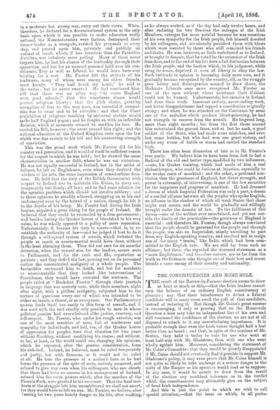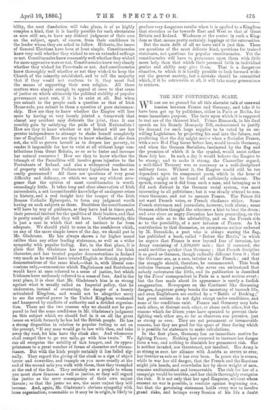THE CONSTITUENCIES AND HOME-RULE.
THE result of the Barrow-in-Furness election seems to show at least as much as this,—that the Irish leaders cannot turn the balance of an ordinary English constituency at pleasure ; nay, that their interference to defeat a Liberal candidate will in many cases swell the poll of that candidate, instead of reducing it. But though Mr. Caine's great success is encouraging, if only as proving that on the Home-rule Question a man may take an independent line of his own and still command the confidence of the electors, we are not at all disposed to attach to it any overwhelming importance. It is probable enough that even the Irish voters thought half a loaf better than no bread ; and that, in spite of the orations of Mr. Sexton, they held it better to vote for one who went at least half-way with Mr. Gladstone, than with one who went wholly against him. Moreover, considering the statement of Mr. Caine's Committee that they would be greatly disappointed if Mr. Caine should not eventually find it possible to support Mr. Gladstone's policy, it may even prove that Mr. Caine himself is not quite so likely to take umbrage at a serious danger to the unity of the Empire as his speeches would lead us to suppose. In any case, it would be unsafe to draw from the result of the election any confident inference as to the verdict which the constituencies may ultimately give on the subject of local Irish independence. And this is just the point to which we wish to call special attention,—that the issue on which, in all probe- bility, the next dissolution will take place, is of so highly complex a kind, that it is hardly possible for such electorates as ours still are, to have any distinct judgment of their own on the subject, apart, of course, from their confidence in the leader whom they are asked to follow. Hitherto, the issues of General Elections have been at least simple. Constituencies knew very well whether they wished to see an extended suffrage or not. Constituencies knew reasonably well whether they wished for more aggressive wars or not. Constituencies knew very clearly whether they wished for Free-trade or not. And constituencies knew thoroughly well whether or not they wished to keep the Church of the minority established, and to tell the majority that if they would not conform to it, they must find the means of supporting their own religion. All these matters were simple enough to appeal at once to that sense of justice on which ultimately the political stability of popular government must rest, if it is to exist at all. Bat when you submit to the people such a question as that of Irish Home-rule, you submit to them a question of pure statesman- ship. How are they to know whether the Empire will lose more by having so very loosely jointed a framework that almost any accident may dislocate the joint, than it can possibly gain by satisfying the pride of Irish Nationalists ? How are they to know whether or not Ireland will use her greater independence to attempt to shake herself completely free of England ? How are they to know whether, if she does not, she will so govern herself as to deepen her poverty, to render it impossible for her to exist at all without large con- tributions from Great Britain, or so as to foster and increase her natural resources ? How are they to know whether the triumph of the Parnellites will involve gross injustice to the Protestants of Ireland, and also a widespread confiscation of property which our Parliamentary legislation has but re- cently guaranteed ? All these are questions of very great difficulty and delicacy, on which we may say without arro- gance that the opinion of most constituencies is worth exceedingly little. It takes long and close observation of Irish antecedents, a not inconsiderable knowledge of analogous crises in history, and a real insight into the temper of the Irish Roman Catholic Episcopate, to form any judgment worth having on such subjects as these. Doubtless the constituencies will have by way of guidance, as they have had in times past, their personal instinct for the qualities of their leaders, and that is pretty nearly all that they will have. Unfortunately, this is just a case in which that sort of instinct is far from adequate. We should yield to none in the confidence which, on any of the more simple issues of the day, we should put in Mr. Gladstone. He has always shown a far higher moral calibre than any other leading statesman, as well as a wider sympathy with popular feeling. But, in the first place, it is plain that Mr. Gladstone has never understood the Irish character, and has treated popular demonstrations in Ireland very much as he would have treated English or Scotch popular demonstrations of the same kind,—that is, with liberal con- cessions only,—concessions which Englishmen and Scotchmen would have at once referred to a sense of justice, but which Irishmen have uniformly referred to a sense of fear. And in the next place, it is clear that Mr. Gladstone's bias is so strong against what is usually called an Imperial policy, that he underrates, instead of overrating, the danger of a loosely articulated Kingdom, and would not be altogether sorry to see the central power in the United Kingdom weakened and hampered by conflicts of authority and a divided organisa- tion. These are the two reasons why we should not be pre- pared to feel the same confidence in Mr. Gladstone's judgment on this subject which we should feel in it on all the great issues on which formerly he has led the British people. He has a strong disposition in relation to popular feeling to act on the precept, "If any man would go to law with thee, and take away thy coat, let him have thy cloak also. And whosoever shall compel thee to go one mile, go with him twain." We can all recognise the nobility of this temper, and its appro- priateness to a great number of forms of character and circum- stance. But with the Irish people certainly it has failed sig- nally. They regard the giving of the cloak as a sign of abject terror and cowardice, and trample on you more cruelly at the end of the second mile you walk with them, than they trampled at the end of the first. They certainly are a people to whom you must show firmness as well as justice, or they will regard the justice as the mere consequence of their own unjust threats ; so that the juster we are, the more unjust they will become. And, again, Mr. Gladstone's obvious sympathy with loose organisation, reasonable as it may be in origin, is likely to
produce very dangerous results when it is applied to a Kingdom that stretches so far towards East and West as that of Great Britain and Ireland. Weakness at the centre in such a King- dom as that, means pretty certainly, loppings at the extremities.
But the main drift of all we have said is just this. These are questions of the most delicate kind, questions for trained statesmen, not questions for popular constituencies. Yet the constituencies will have to pronounce upon them with little more help than that which their personal faith in individual genius and ability may give them. That is a dangerous situation, to which it is hardly possible to look forward with- out the gravest anxiety, lest a mistake should be committed which, if it be retrievable at all, it will take many generations to retrieve.



































 Previous page
Previous page